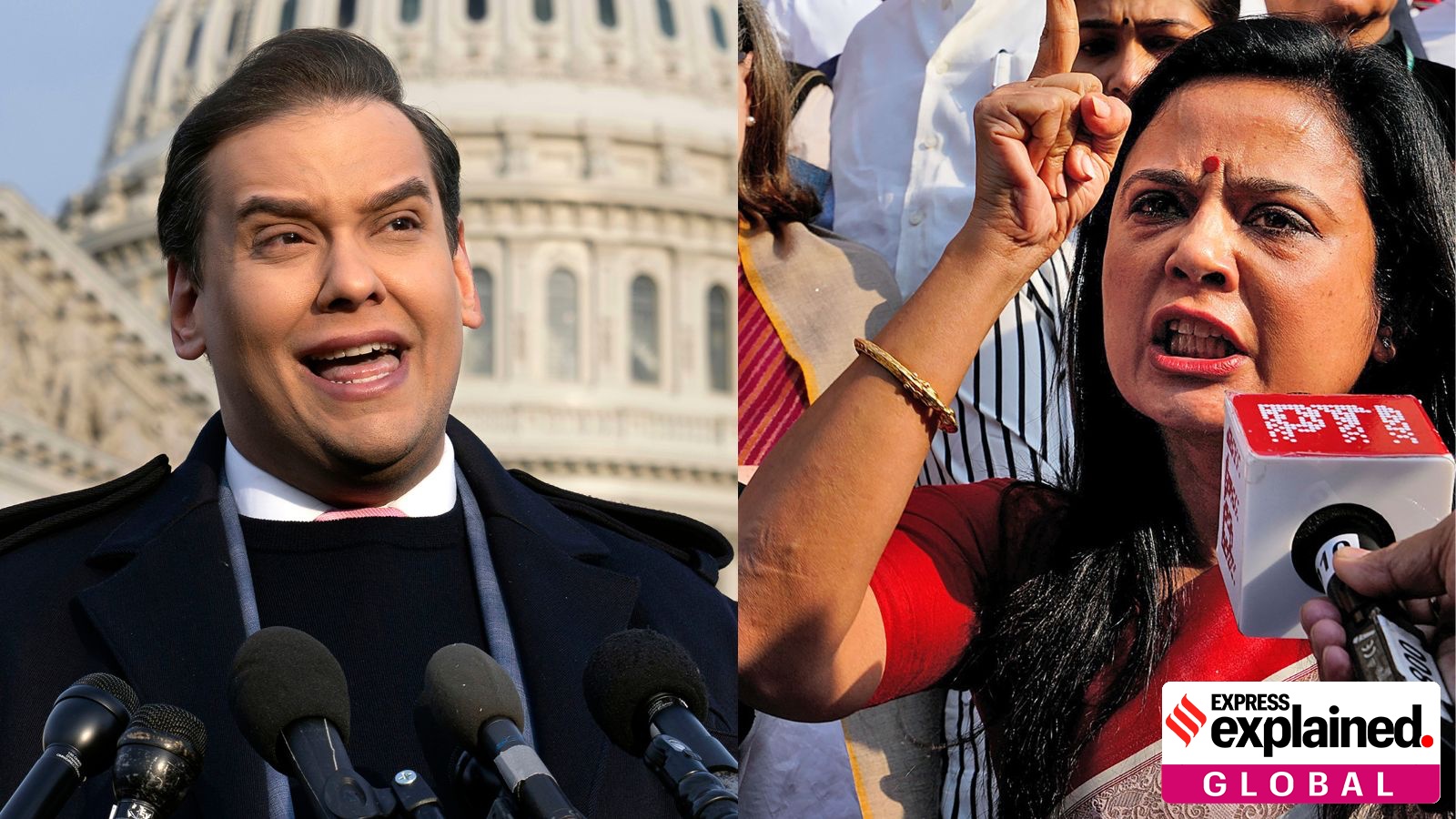This happened a week after Republican Congressman George Santos was expelled from the United States House of Representatives on December 1, also on the basis of a House Ethics Committee report on a slew of allegations against him.
The expulsion of a representative of the people by other members of the House is a rare and extremely serious step. Here are the stories of these two expulsions, in the oldest and the largest democracies of the world.
Both Santos and Moitra entered politics from the world of finance
George Santos, 35, entered the political limelight in 2019 as the leader of a small pro-Trump group in New York. Prior to that, he had worked at various places in the finance sector. He had started a company, Devolder Organization, which he describes as a “capital introduction consulting” firm.

After a failed bid to enter Congress in 2020, Santos was elected from New York’s 3rd Congressional District in 2022. In his relatively brief political career, Santos has been known for his devoutly pro-Trump leanings and ultra conservative positions on various issues (despite being openly gay himself), and a series of provocative statements.
Mahua Moitra, 49, entered Indian politics in 2009, after a successful career as an investment banker with JPMorgan Chase in New York City and London. She was briefly in the Congress party, before switching to the TMC in 2010. She was elected to the West Bengal Legislative Assembly in 2016, before becoming the first-term MP from Krishnanagar in 2019.
In Parliament, Moitra has been one of the Opposition’s most articulate and high-profile voices, and has criticised the Narendra Modi government relentlessly.
Both Santos and Moitra faced allegations of corruption
Chinks began to appear in Santos’ seemingly impressive résumé almost as soon as he was elected to the US House in November 2022. It was discovered that he had lied about pretty much everything — from his Jewish heritage to claims of having worked in Citigroup and Goldman Sachs. But this was just the tip of the iceberg.
Under the glare of public scrutiny, alleged criminal acts began to emerge. Santos is currently facing 23 felony charges, ranging from wire fraud to making materially false statements to the US Congress. The US House Ethics Committee began its investigation of Santos after the first federal charges were filed in May 2023.
The allegation against Moitra came up this October, when BJP MP Nishikant Dubey, based on a complaint by Supreme Court lawyer Jai Anant Dehadrai, alleged that she had asked questions in Parliament in exchange for cash and gifts from businessman Darshan Hiranandani, whose business interests conflicted with those of industrialist Gautam Adani.
Notably, Mahua has been fiercely critical of Adani, his alleged corruption, and alleged proximity to the ruling party. Hiranandani would later, in an affidavit, say that Mahua provided him with her Lok Sabha login ID and password, so that he could directly “post questions” “on her behalf”. Dubey’s cash-for-query complaint was taken up by the Lok Sabha Ethics Committee.
The Ethics Committees of the US House of Representatives and of the Lok Sabha
The US House Committee on Ethics was founded in 1967, and is the only standing committee of the House whose membership is divided evenly (five each) between the two major political parties, with the Chair coming from the party in majority.
It has three main functions: i) to provide ethics training to House Members, officers, and employees, ii) to investigate and adjudicate any alleged violations of the House rules or any related statutes by members, officers, or employees, and iii) to review financial disclosure statements filed by members, candidates, senior staff, and shared staff.
The committee assignments are for a period of two years, although Members might serve multiple consecutive terms.
The Lok Sabha Ethics Committee was established in 2000, on an ad hoc basis, and it became a permanent part of the House only in 2015. Members are appointed by the Speaker for a period of one year, and the Committee has cross party-representation, roughly proportional to the party’s strength in the House. It has a strength of 15 members.
Its remit is loosely defined: “to oversee the moral and ethical conduct of the Members; and to examine the cases referred to it with reference to ethical and other misconduct of the Members”.
It is different from the Privileges Committee. Usually, more serious allegations are sent to the Privileges Committee, which seeks to safeguard the “freedom, authority, and dignity of Parliament”.
The reports of the two Ethics Committees
The Ethics Committee in the US carried out an in-depth, months-long investigation. It concluded that George Santos broke federal laws, stole from his campaign and delivered a “constant series of lies” to voters and donors on his way to winning a US House seat. The 56-page report said that the House Committee investigators amassed more than 170,000 pages of documents and testimony from “dozens of witnesses” as part of their inquiry.
A separate, ongoing federal investigation on Santos found additional “uncharged and unlawful conduct” which will be referred to the Department of Justice. Many of these findings were independently investigated and reported in the US media.
The 108-page report on Moitra’s alleged misconduct found her guilty of “unethical conduct” and “contempt of the House” for sharing her user ID and password with “unauthorised persons” — and said this affected national security.
The Lok Sabha committee concluded that of the 61 questions posed by Moitra on the portal, 50 were with the intent of “protecting or perpetuating business interests” of Hiranandani. It consequently recommended the expulsion of Mahua from the House and an institution of an “intense, legal and institutional” inquiry by the government.
How the two cases differ: the process and timelines
- The US Ethics Committee report made no specific recommendations — it simply encouraged House members to “take any action they deem appropriate and necessary”, based on the report’s findings, to fulfill the House’s Constitutional mandate to police the conduct of its Members. The Lok Sabha Ethics Committee explicitly recommended Mahua Moitra’s expulsion.
- George Santos’ expulsion was driven by his loss of support, especially within his own party. The US House voted 311-114 in favour of Santos’ expulsion with 105 Republicans voting for it. This was well above the required two-third majority to pass such a vote. Notably, the GOP did not try to whip its members to vote against the motion.
- This is not the case with Mahua who was, in effect, expelled by the BJP members of the House. The Opposition staged a walk-out before a voice vote to expel her was held in the House. The BJP issued a whip to all members to be present in the House during the proceedings.
- The timelines in both cases are very different. It has been a year since the first allegations against George Santos emerged last December. Since then, there have been many more allegations made, as well as a federal investigation opened against Santos’ misconduct. The US House Ethics Committee submitted its report after around a 6-month long investigation, and Santos was expelled a fortnight later.
- In Moitra’s case, the allegation was first made in October, and the hearing was short and rancorous, with both Moitra and the opposition members in the committee protesting against the process that was followed. The report was filed in less than two months, and she was quickly expelled.
- George Santos was, as per the Ethics Committee report, not cooperative with the investigation. However, when the debate on his expulsion was taking place in the US House, he was allowed to speak on the floor of the House.
- Moitra appeared before the committee but complained she was subjected to what amounted to a “vastra-haran, a disrobing, a witch-hunt of the worst kind”. She was also not given an opportunity to speak on the floor of the House.

Ananya Das is your guide to the latest trends, viral sensations, and internet phenomena. Based on a keen understanding of digital culture, Sophie navigates the ever-evolving landscape of trending topics. With an insightful and engaging approach, she explores what’s buzzing across social media platforms, ensuring readers stay in the loop with the most talked-about and shareable content online.


